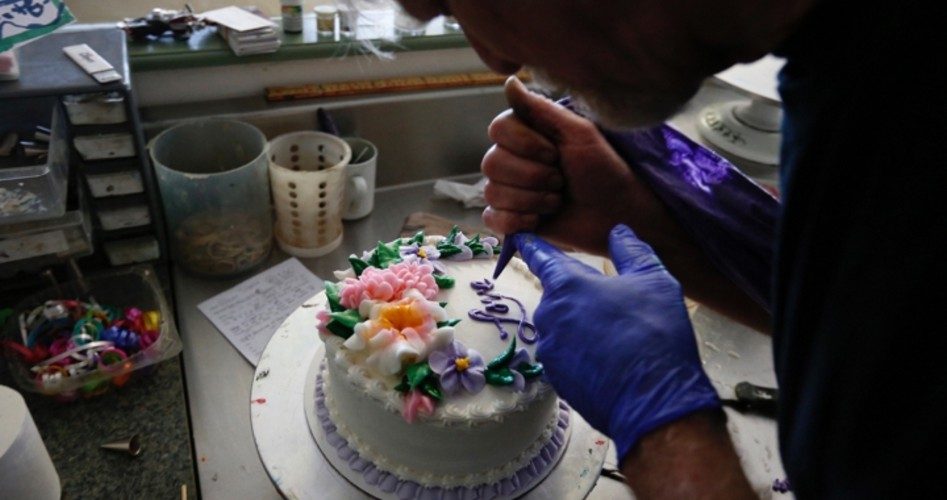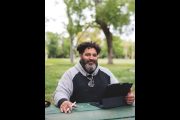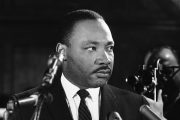
The importance of the 2016 presidential election was clear on Monday, when the U.S. Supreme Court announced that it will hear a case from Colorado involving a baker asked to bake a cake for a same-sex wedding. Had Hillary Clinton defeated Donald Trump, Neal Gorsuch would not be on the Supreme Court, and the court would have either refused to take the case, or taken it so as to put its stamp of approval on the use of “anti-discrimination” laws to force service businesses to work for a same-sex wedding celebration, regardless of their religious beliefs.
The case involves a baker in Denver who refused to sell a wedding cake to a same-sex couple. It is billed in the mainstream media as religious liberty versus opposition to discrimination based on sexual orientation. Jack Phillips (shown), the owner of Masterpiece Cake Shop, refused to bake a cake for a wedding reception for same-sex couple David Mullins and Charlie Craig back in July 2012. He told them that his religious beliefs precluded him from endorsing a same-sex wedding celebration, but that he was sure another bakery would have no such qualms.
At the time, same-sex marriages were not even legally recognized in Colorado. The couple intended to marry in Massachusetts, which had legalized same-sex marriage, then hold a reception in Colorado, where they lived. Despite same-sex marriage not even being legally recognized by Colorado law, the couple filed a discrimination complaint with the Colorado Civil Rights Commission, with the assistance of the American Civil Liberties Union (ACLU). The commission issued a ruling in 2014 that Phillips had violated the state’s law which banned discrimination based on sexual orientation.
A Colorado appeals court upheld the decision of the commission, saying that if Phillips “wishes to operate as a public accommodation and conduct business within the State of Colorado,” the Anti-Discrimination Act “prohibits [him] from picking and choosing customers based on their sexual orientation.” Anticipating arguments that the homosexual couple was picking on Christians, the court opined that the law “does not impose burdens on religious conduct not imposed on secular conduct.”
The Colorado Supreme Court chose not to take the case, so Phillips decided to take it to the U.S. Supreme Court. His decision surprised some observers of the U.S. Supreme Court, because it has chosen not to hear similar cases in the past. For example, the high court turned down the appeal by a wedding photographer in New Mexico only two years ago. The court reportedly first considered the Phillips case last September (when it was at eight members, pending the replacement of the late Antonin Scalia after the November presidential contest).
The difference, however, may be the addition of Gorsuch to the court, which increased the number of justices to nine, perhaps tipping the scales in Phillips’ favor for the case to be heard.
Phillips argued that he deserved a religious exemption based on the guarantees of free speech and the free exercise of religion found in the First Amendment. Jeremy Tedesco, an attorney for The Alliance Defending Freedom (ADF), which has taken on religious liberty cases in the past, commented on the case. “They said you have to create cakes for same-sex couples, so he removed himself from the market. He chose to stop making wedding cakes.”
David Clortman, another attorney with ADF, declared,
Every American should be free to choose which art they will create and which art they won’t create without fear of being unjustly punished by the government. It imperils everyone’s freedom by crushing dissent instead of tolerating a diversity of views. We are all at risk when government is able to punish citizens like Jack just because it doesn’t like how he exercises his artistic freedom.
The ACLU, not surprisingly, favors “gay rights” over religious liberty, despite the term “civil liberties” in the organization’s name. James Esseks, director of the ACLU’s LGBT Project, asserted, “The law is squarely on David and Charlie’s side because when businesses are open to the public, they’re supposed to be open to everyone.”
Charlie Craig issued a statement saying it was just all about discrimination: “While we’re disappointed that the courts continue debating the simple question of whether LGBT people deserve to be treated like everyone else, we hope that our case helps ensure that no one has to experience being turned away simply because of who they are.”
But Phillips did not turn them away “simply because of who they are.” He had performed services for them in the past, with no problem. In this case, he was not refusing to bake them a cake because they were a homosexual couple, but rather because they were asking him to use his cake-decorating skills to bake a cake celebrating something he considered immoral and unscriptural.
It is known that in the past, Phillips has refused to bake cakes that celebrate Halloween, carry profane messages, or have messages that are “anti-American or anti-family.”
The mainstream media, the ACLU, the homosexual couple, and the courts have so far missed this point (either deliberately or out of ignorance). The 1964 Civil Rights Act prohibits private discrimination in public accommodations based on an irrational prejudice against someone’s skin color, or other similar reason. Regardless of what one thinks about the constitutionality of the act, it was designed to protect a person from being denied a hotel room or a meal because of who they were.
An analogous situation with the wedding cake would be if Phillips refused to bake some cookies for customers simply because they were black, or Jewish, or, in this case, homosexuals.
This is a common misapplication when it comes to these “LGBT” cases. For example, the Washington Supreme Court ruled 9-0 that Barronelle Stutzman, a Christian florist in Richland, Washington, violated the rights of some homosexuals when she refused to provide a flower arrangement for their same-sex wedding.
She stated, “It was terrifying when you think that the government is coming in and telling you what to think and what to do and what to say.” She made similar arguments as Phillips, saying that she was simply exercising her First Amendment-protected rights. The Washington State Court dismissed that argument, contending that providing flowers for a same-sex wedding would not serve as an endorsement of same-sex marriage.
“As Stutzman acknowledged at deposition,” the court opined, “providing flowers for a wedding between Muslims would not necessarily constitute an endorsement of Islam, nor would providing flowers for an atheist couple endorse atheism.”
This statement illustrates vividly the low level of logic used by even some state supreme court judges (unless they are simply being duplicitous). A marriage between a Muslim man and woman, or an atheist man and woman, would still be marriage between a man and a woman. The fact that they happened to be Muslims or an atheists makes no more difference than if they were two New York Yankees fans. There is nothing in the Bible (which Phillips believes is the word of God) that prohibits two non-believers from marrying each other, as long as one is a man and one is a woman.
There is little reason to doubt that over the years, Phillips has sold baked goods to many customers with whom he would disagree on religion, politics, or even who is going to win the World Series. That apparently had not mattered to Phillips. He had even provided baked goods for Mullins and Craig. But if a would-be customer asked him to bake a cake decorated with words challenging the deity of Jesus Christ, or something similar, then it would be his right to say no. One would not expect a Jew whose grandmother died in the Holocaust to bake a cake for a Nazi group to celebrate the Holocaust, a Muslim baker to write something negative about Muhammad on a cake, or an atheist to be forced to write Psalm 14, verse 1, on a cake: “The fool has said in his heart there is no God.”
Photo: AP Images



